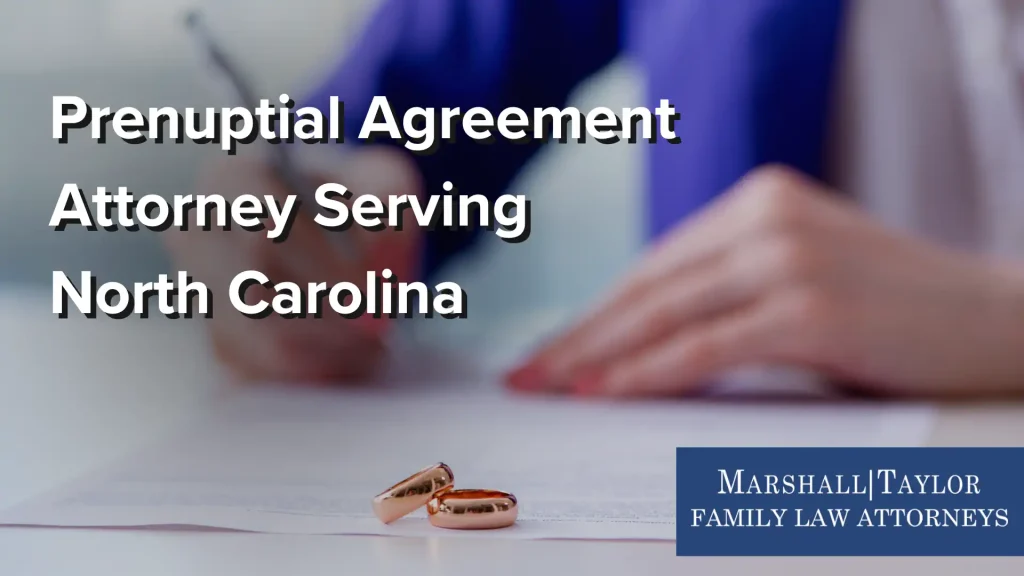
For many, getting married is one of life’s significant milestones. It is an event filled with love, mutual growth, and shared dreams. It’s important to note that marriage also comes with important legal and financial responsibilities, and the best way to protect your financial future might be to put a prenuptial agreement (or “prenup”) in place.
In North Carolina, a prenuptial agreement is a legal contract agreed upon before marriage. It outlines the distribution of assets, properties, and debts in case of divorce or the death of a spouse. Discussing prenups can be challenging and may even seem unromantic. However, it’s an essential topic to consider since these agreements can help to safeguard individual assets, protect business interests, or to establish financial responsibilities and division of assets in case the marriage ends, thereby reducing potential disputes and complexities during a divorce.
The Raleigh family law attorneys at Marshall & Taylor PLLC understand the sensitive nature of prenups and are here to help you understand your rights and legal options before marriage. Our team includes a board-certified family law specialist, and we can use that knowledge and experience for your benefit. Call (919) 833-1040 today or complete our contact form for a consultation.
What Can a Prenup Cover in North Carolina?
In North Carolina, a prenuptial agreement, also known as a premarital agreement, can cover a variety of financial matters, including but not limited to:
- Property rights – It can define separate property and marital property and how it should be divided in the event of a divorce.
- Spousal support – The agreement can outline the terms for alimony or spousal support that one party would pay the other after a divorce.
- Debts – It can specify how debts will be divided or assigned to each party in case of a divorce.
- Inheritance and estate plans – The prenup can include stipulations about inheritance and estate rights, ensuring that certain properties are passed to children from previous marriages or other designated heirs.
- Management of assets – It can lay out how assets (like a home or business) will be managed during the marriage, including details about who has the right to buy, sell, or use certain assets.
There are notable limitations to prenuptial agreements. For instance, a prenup cannot determine child custody or child support issues, as these are determined based on the child’s best interest at the time of the divorce. Additionally, any clauses that promote divorce or are seen as grossly unfair could be invalidated by a court. Working with a knowledgeable attorney when drafting a prenuptial agreement is important to ensure it meets all legal requirements.
Enforcing a Prenup in North Carolina
North Carolina makes it relatively easy to create a prenup. As long as the agreement is in writing and both spouses sign it before marriage, the courts will usually consider it valid. Couples do not have to have a prenup notarized, but doing so is still a good idea.
However, a spouse could ask to have a prenup invalidated in certain circumstances. The first is if they did not sign the agreement voluntarily. The second is if the agreement was “unconscionable” (meaning severely unfair) when they signed it. To demonstrate a prenup is unconscionable, the spouse seeking to have the agreement invalidated must prove the following:
- The other spouse did not fully disclose their debts.
- The spouse seeking to invalidate the agreement did not waive their right to see the other spouse’s financial information.
- The spouse seeking to invalidate the agreement could not have had adequate knowledge of the other spouse’s financial situation.
It’s often difficult to invalidate a prenup, so if you believe your agreement is unfair, talk to a family law attorney immediately.
Who Needs a Prenup in North Carolina?
 In North Carolina, a prenuptial agreement can be beneficial for a variety of individuals. It’s often a consideration for those who enter the marriage with substantial assets, properties, or a thriving business. This is because they may wish to ensure these assets remain separate from marital property, thereby protecting them in case of a divorce.
In North Carolina, a prenuptial agreement can be beneficial for a variety of individuals. It’s often a consideration for those who enter the marriage with substantial assets, properties, or a thriving business. This is because they may wish to ensure these assets remain separate from marital property, thereby protecting them in case of a divorce.
Individuals who have children from a previous relationship also often consider a prenup. This allows them to protect their children’s inheritance rights, ensuring specific assets are passed on to their children.
Those who have significant debts may also consider a prenuptial agreement. They can use it to ensure that their debts remain their responsibility, preventing their spouse from becoming liable for these debts in the event of a divorce.
A person expecting a large inheritance, a rise in income, or ownership of a successful business in the future may also want a prenup. They might use the agreement to establish how these assets will be handled, preventing potential disputes down the line.
Finally, individuals who have been through a tough divorce in the past often consider a prenuptial agreement for subsequent marriages. It can give them a sense of security knowing that specific financial matters are predetermined.
Do’s and Don’ts of North Carolina Prenups
When considering a prenuptial agreement in North Carolina, it’s crucial to understand the best practices, as well as potential pitfalls. Here are some of the “do’s” and “don’ts”:
Do’s
- Retain separate attorneys – Both parties should have independent legal counsel to ensure each person’s interests are properly represented. This helps ensure the agreement is fair and balanced.
- Be transparent: Full disclosure of all assets, debts, and income is essential. A prenuptial agreement can be invalidated if it is found that either party withheld significant information.
- Plan ahead – A prenuptial agreement should be considered well in advance of the wedding. Rushing could lead to pressure or the appearance of coercion, which could potentially render the agreement void.
- Review regularly – Circumstances change over time, and so can the implications of your prenup. It’s a good idea to review the agreement every few years or after major life changes, like the birth of a child or a significant change in financial status.
Don’ts
- Don’t skimp on details – Being vague or non-specific about assets, debts, and how they should be divided can lead to issues in the event of a divorce.
- Don’t include personal, non-financial matters – Prenups are primarily for financial and property-related matters. Trying to dictate personal behavior or non-financial aspects (like household chores, frequency of visits to in-laws, etc.) can undermine the validity of the agreement.
- Don’t violate fairness standards – Prenups cannot be grossly unfair to one party, nor can they promote divorce. If a court finds the agreement to be unconscionable or in violation of public policy, it may refuse to enforce it.
- Don’t include child custody or support – Decisions about child custody and support are based on the child’s best interest at the time of divorce and cannot be predetermined in a prenuptial agreement.
If you are considering a prenuptial agreement before marriage, our North Carolina family law firm is ready to help you understand your rights and legal options. Call (919) 833-1040 or reach out online for a confidential consultation with a knowledgeable and understanding member of our team.
